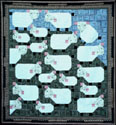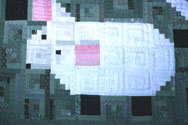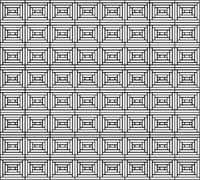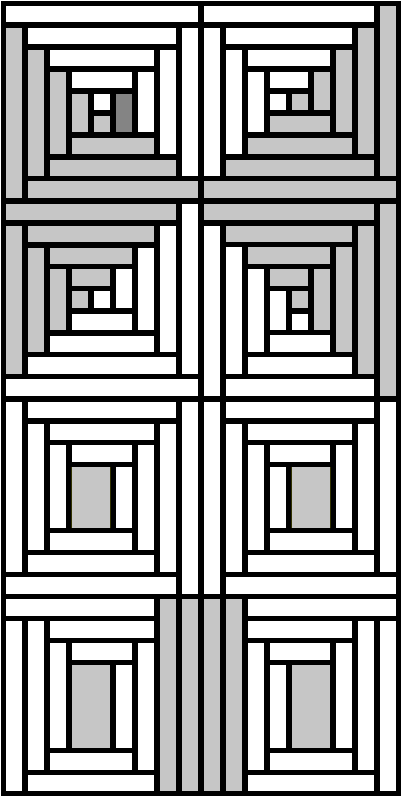|
A
Peek
Into
Log
Cabins Landscapes |
 To depict a scene in patchwork
Log Cabin, one typically breaks down the landscape inspiration into a simple
line drawing. Once the scene has been
stylized and simplified to
To depict a scene in patchwork
Log Cabin, one typically breaks down the landscape inspiration into a simple
line drawing. Once the scene has been
stylized and simplified to
 elementary art, objects such as mountains, clouds, the sea, sailboats and trees are shaped
and reshaped to fit into a Log Cabin
design. Within a
Log Cabin block each log can be a different fabric or they may all be of
the same fabric. Each
Log Cabin Landscape design is unique regarding what types of blocks are used and
how they are arranged into an overall grid. Frequently the
dominant lines of the drawing help determine whether square or
rectangular blocks are best. The size of the quilt helps determine
the Log Cabin block sizes and log widths within the blocks.
elementary art, objects such as mountains, clouds, the sea, sailboats and trees are shaped
and reshaped to fit into a Log Cabin
design. Within a
Log Cabin block each log can be a different fabric or they may all be of
the same fabric. Each
Log Cabin Landscape design is unique regarding what types of blocks are used and
how they are arranged into an overall grid. Frequently the
dominant lines of the drawing help determine whether square or
rectangular blocks are best. The size of the quilt helps determine
the Log Cabin block sizes and log widths within the blocks.
 One design may consist entirely of rectangular Courthouse Steps blocks
set in a horizontal grid. Another design idea may use a multitude
of squares and rectangles in varying sizes that fit into a grid much
like puzzle pieces. The grid becomes a scale drawing or map of the
design with each block numbered. When necessary,
shapes are drawn beyond the edge of any one Log Cabin block, utilizing adjacent
logs in surrounding blocks. Pieced logs within a block may be useful in
creating a specific shape. Turning a design into a Log
Cabin Landscape also relies on changing colors from one area to another.
One design may consist entirely of rectangular Courthouse Steps blocks
set in a horizontal grid. Another design idea may use a multitude
of squares and rectangles in varying sizes that fit into a grid much
like puzzle pieces. The grid becomes a scale drawing or map of the
design with each block numbered. When necessary,
shapes are drawn beyond the edge of any one Log Cabin block, utilizing adjacent
logs in surrounding blocks. Pieced logs within a block may be useful in
creating a specific shape. Turning a design into a Log
Cabin Landscape also relies on changing colors from one area to another.

 Using "Geese in Flight" as an example, peek
into a visual journey of a design process. Each Log Cabin landscape
quilt involves problem-solving and
some degree of trial and error. Colorful and distinctive
Canada geese were the
primary
focus of a Log Cabin landscape design depicting a flight of
geese
over a marshy area, with mountains in the background and a
late
afternoon sun beginning to set. The sun is circular, yet it is in a rectangular
grid.
Using "Geese in Flight" as an example, peek
into a visual journey of a design process. Each Log Cabin landscape
quilt involves problem-solving and
some degree of trial and error. Colorful and distinctive
Canada geese were the
primary
focus of a Log Cabin landscape design depicting a flight of
geese
over a marshy area, with mountains in the background and a
late
afternoon sun beginning to set. The sun is circular, yet it is in a rectangular
grid.  To
emphasize the geese, their black and white necks were elongated.
This allowed each goose
To
emphasize the geese, their black and white necks were elongated.
This allowed each goose
 to extend the full width of a rectangular block.
To
provide variety, two
simple and stylized
drawings of geese were alternated in the flight
pattern.
to extend the full width of a rectangular block.
To
provide variety, two
simple and stylized
drawings of geese were alternated in the flight
pattern.
 The
wings were constructed of narrow strips pieced together, then cut into the
shape of wings. The wings and breasts were appliquéd onto the
block. The pieced goose neck and body created a
"log" that was sewn into a completed rectangular Log Cabin
block.
The
wings were constructed of narrow strips pieced together, then cut into the
shape of wings. The wings and breasts were appliquéd onto the
block. The pieced goose neck and body created a
"log" that was sewn into a completed rectangular Log Cabin
block.
To promote a feeling of spatial perspective, one goose was superimposed on
one of the distant mountains. The mountains were quilted twice as
densely as other areas of the quilt to promote the feel of distance.
 Breaking the design inspiration down into the basic shapes and keeping details simplified allowed the quilt to be created using only 56 Rectangular Courthouse Steps blocks. Strips of fabric were cut 1 1/4" wide and
finished log width throughout the quilt was 3/4" wide. The strip piecing for the goose wings were cut 1" wide and finished 1/2" wide.
Breaking the design inspiration down into the basic shapes and keeping details simplified allowed the quilt to be created using only 56 Rectangular Courthouse Steps blocks. Strips of fabric were cut 1 1/4" wide and
finished log width throughout the quilt was 3/4" wide. The strip piecing for the goose wings were cut 1" wide and finished 1/2" wide.A Rectangular Courthouse Steps grid may be useful to you if you have a unique design that will lend itself to the constraints of Log Cabin.
You can click on any of these images to obtain a
larger, printable image.

 Buildings and houses can be drawn on block grids, taking advantage of the
power of repetition. Once the basic building shape has been
determined,
repeat it over and over again or be creative and develop a
series of building shapes. Changing colors can depict windows, doors, roofs and chimneys. Variations in window sizes
are possible by changing the size of the center square.
Buildings and houses can be drawn on block grids, taking advantage of the
power of repetition. Once the basic building shape has been
determined,
repeat it over and over again or be creative and develop a
series of building shapes. Changing colors can depict windows, doors, roofs and chimneys. Variations in window sizes
are possible by changing the size of the center square.
Click
here
to
obtain
a
FREE
online
pattern
of
"Around
the
Corner."
